Celtic Cross Spread
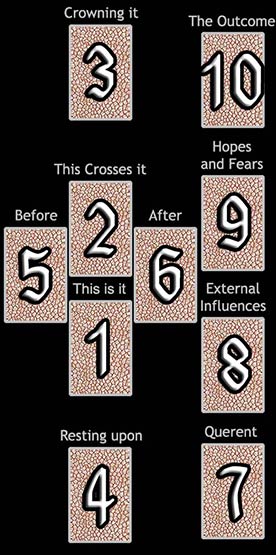
Difficulty: Average
This is probably the most well-known tarot spread. A good, basic spread for beginners to practise with, the Celtic Cross is useful for questions of all types. In this spread, it can be helpful to notice the relationships between the pairings of cards #5 & #9, #1 & #2, #3 & #4, and #6 & #10.
- The significator epitomizes what the reading deals with, the initial situation.
- An added impulse that compounds the significator, which may be either complimentary or contradictory.
- This is what is consciously known (thoughts).
- Unconscious driving forces that may not be known fully (emotions).
- The immediate past regarding the current situation.
- The first future card indicates the immediate future.
- This card represents the reader and their attitude towards cards #1 and #2.
- The external influences, the places and people which influence the topic.
- This tarot card suggests expectations; what is secretly hoped for or feared.
- The second future card reveals the long-term outcome.
Your Celtic Cross Reading
The Crown |
The Outcome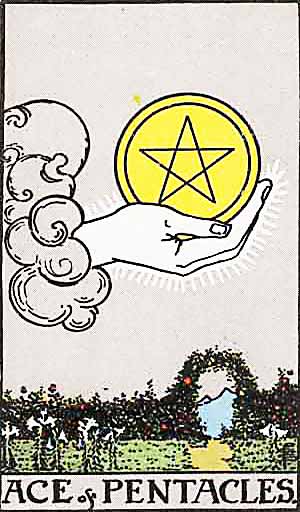 Ace of Pentacles
External Forces 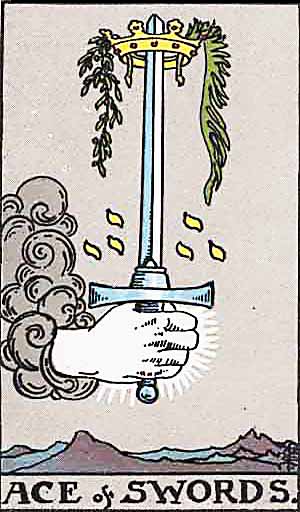 Ace of Swords
|
||
The Recent Past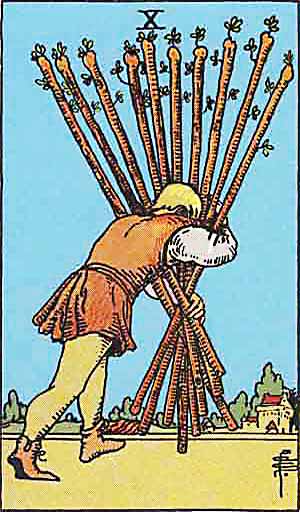 10 of Wands |
This Crosses the Significator
|
The Future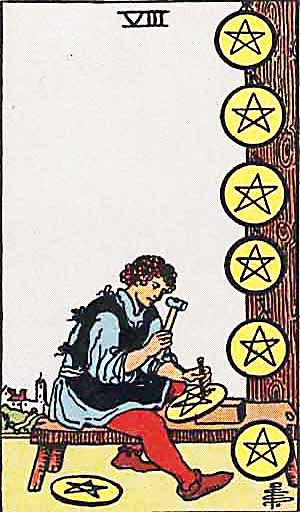 8 of Pentacles |
|
|
|||
The Significator represents what the main theme of the reading deals with, the initial situation.
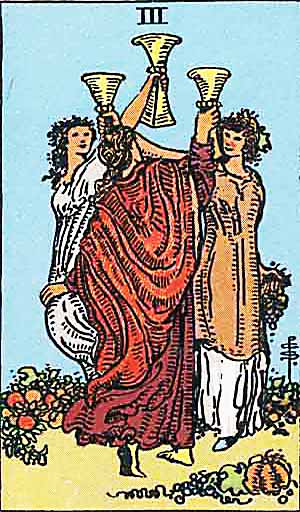
3 of Cups
Maidens in a garden-ground with cups uplifted, as if pledging one another.
Divinatory Meaning:
The conclusion of any matter in plenty, perfection and merriment; happy issue, victory, fulfilment, solace, healing.
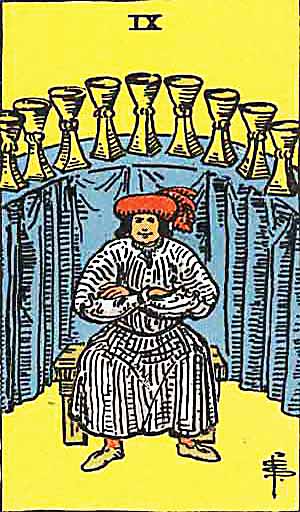
This Crosses the Significator denotes an added impulse that compounds the initial card, whether complimentary or contradictory.
9 of Cups
A goodly personage has feasted to his heart's content, and abundant refreshment of wine is on the arched counter behind him, seeming to indicate that the future is also assured. The picture offers the material side only, but there are other aspects.
Reversed Meaning:
Truth, loyalty, liberty; but the readings vary and include mistakes, imperfections, etc.
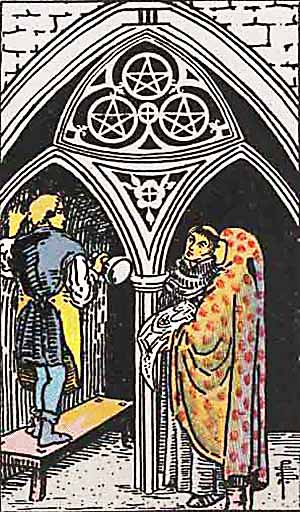
The Crown stands for what the asker is aware of consciously.
3 of Pentacles
A sculptor at his work in a monastery. Compare the design which illustrates the Eight of Pentacles. The apprentice or amateur therein has received his reward and is now at work in earnest.
Divinatory Meaning:
Metier, trade, skilled labour; usually, however, regarded as a card of nobility, aristocracy, renown, glory.
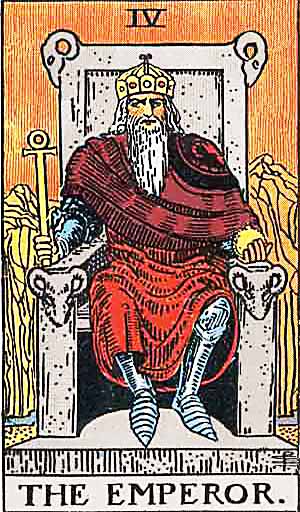
The Foundation reveals unconscious driving forces that the querent may not be aware of.
The Emperor
He has a form of the Crux ansata for his sceptre and a globe in his left hand. He is a crowned monarch – commanding, stately, seated on a throne, the arms of which axe fronted by ram heads. He is executive and realisation, the power of this world, here clothed with the highest of its natural attributes. He is occasionally represented as seated on a cubic stone, which, however, confuses some of the issues. He is the virile power, to which the Empress responds, and in this sense is he who seeks to remove the Veil of Isis; yet she remains virgo intacta.
It should be understood that this card and that of the Empress do not precisely represent the condition of married life, though this state is implied. On the surface, as I have indicated, they stand for mundane royalty, uplifted on the seats of the mighty; but above this there is the suggestion of another presence. They signify also – and the male figure especially – the higher kingship, occupying the intellectual throne. Hereof is the lordship of thought rather than of the animal world. Both personalities, after their own manner, are full of strange experience, but theirs is not consciously the wisdom which draws from a higher world. The Emperor has been described as (a) will in its embodied form, but this is only one of its applications, and (b) as an expression of virtualities contained in the Absolute Being – but this is fantasy.
Reversed Meaning:
Benevolence, compassion, credit; also, confusion to enemies, obstruction, immaturity.

The Recent Past represents past events and concerns.
10 of Wands
A man oppressed by the weight of the ten staves which he is carrying.
Reversed Meaning:
Contrarieties, difficulties, intrigues, and their analogies.

The Future depicts that which lies ahead.
9 of Cups
A goodly personage has feasted to his heart's content, and abundant refreshment of wine is on the arched counter behind him, seeming to indicate that the future is also assured. The picture offers the material side only, but there are other aspects.
Reversed Meaning:
Truth, loyalty, liberty; but the readings vary and include mistakes, imperfections, etc.
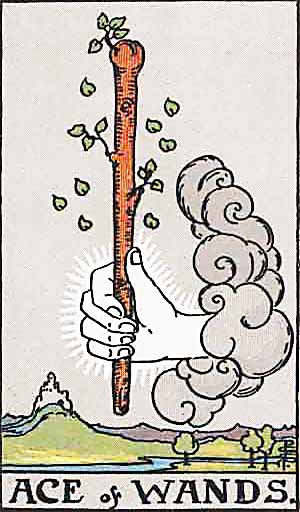
The Querent represents the asker and their attitude towards the subject of the reading.
Ace of Wands
A hand issuing from a cloud grasps a stout wand or club.
Divinatory Meaning:
Creation, invention, enterprise, the powers which result in these; principle, beginning, source; birth, family, origin, and in a sense the virility which is behind them; the starting point of enterprises; according to another account, money, fortune, inheritance.

External Forces represents the influence of others in your life as well as trends in your relationships with others.
Ace of Swords
A hand issues from a cloud, grasping as word, the point of which is encircled by a crown.
Divinatory Meaning:
Triumph, the excessive degree in everything, conquest, triumph of force. It is a card of great force, in love as well as in hatred. The crown may carry a much higher significance than comes usually within the sphere of fortune-telling.
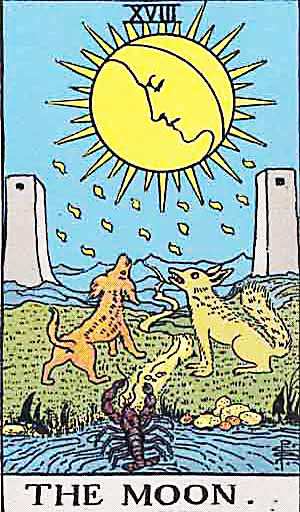
Hopes and Fears shows the expectations you have concerning the outcome of your question.
The Moon
The distinction between this card and some of the conventional types is that the moon is increasing on what is called the side of mercy, to the right of the observer. It has sixteen chief and sixteen secondary rays. The card represents life of the imagination apart from life of the spirit. The path between the towers is the issue into the unknown. The dog and wolf are the fears of the natural mind in the presence of that place of exit, when there is only reflected light to guide it.
The last reference is a key to another form of symbolism. The intellectual light is a reflection and beyond it is the unknown mystery which it cannot shew forth. It illuminates our animal nature, types of which are represented below – the dog, the wolf and that which comes up out of the deeps, the nameless and hideous tendency which is lower than the savage beast. It strives to attain manifestation, symbolised by crawling from the abyss of water to the land, but as a rule it sinks back whence it came. The face of the mind directs a calm gaze upon the unrest below; the dew of thought falls; the message is: Peace, be still; and it may be that there shall come a calm upon the animal nature, while the abyss beneath shall cease from giving up a form.
Divinatory Meaning:
Hidden enemies, danger, calumny, darkness, terror, deception, occult forces, error.

The Outcome of your question. Interpret this card in the context of the entire reading and as an indicator of the path you are currently on, but not necessarily bound to.
Ace of Pentacles
A hand – issuing from a cloud – holds up a pentacle.
Divinatory Meaning:
Perfect contentment, felicity, ecstasy; also, speedy intelligence; gold.
